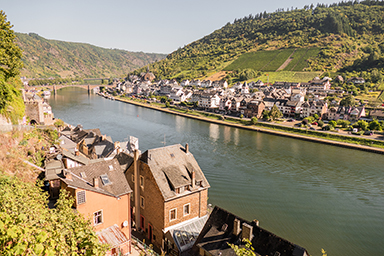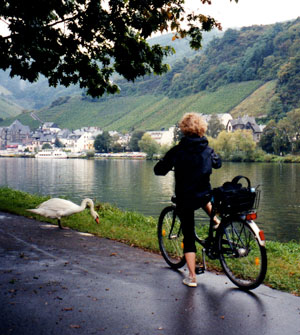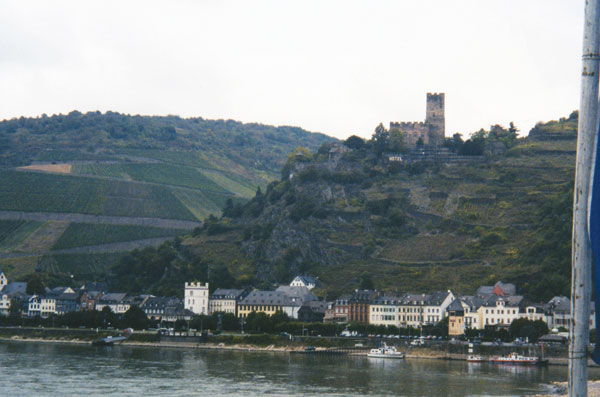BACHARACH, GERMANY – The charming lady in the housecoat and apron stuffs bread, cheese and a half bottle of wine into the unsuspecting cyclists’ knapsacks moments after they devour the wonderful breakfast she’s prepared.
“You will need lots of energy today – you will be on your bikes many hours. Now you have food to eat along the trails,” says the Haus Erdinger innkeeper as she looks around to make sure my fellow cyclists have not seen her act of generosity.
“My goodness,” exclaims Judy, one of the cyclists as she attempts to lift her bag. “I guess all that cycling yesterday made me weak. This bag seems a lot heavier today.”
With that, we mount our bikes, wave goodbye to the lady at the Haus Erdinger B&B – circa 1730 - and head off in the direction of this charming medieval hamlet.
We arrived a few days earlier in Frankfurt, took a bus to Koblenz, where we enjoyed a traditional German meal at the Alte Muehle restaurant in a nearby wine village called Kobern-Goondorf, and sleept off our jet lag at a spa hotel called the Dorint.

Above: Vineyards heavy with grapes sweep down into the lovely Mosel river.
Next morning we board a train – with our bikes – and 40 miles later get off in Bingen, where we pick up a trail on the first leg of our cycling journey through the enchanting Hessen and Rheinland-Pfalz regions, where most of Germany’s sweet Riesling is produced.
The trail, for the most part, follows the gently flowing Rhine and Moselle rivers and takes us deep into the heart of Germany’s wine country, where towns roll out the welcome mat for cyclists. Here, guesthouses (gstehaus) and B&Bs offer reasonable accommodation, which include a big breakfast – the leftovers make a nourishing lunch.
Cycling holidays are among the most popular tourist activities in Germany. Many tour companies on both sides of the Atlantic have made it their only offering – and have become wealthy doing it. The gently-sloping routes are not strenuous, and anyone in reasonable health can partake.
To complete our intended route, we’ll need to cycle about 15 miles a day. Not an easy task with so many vineyards in between.
The wineries offer samplings of their products and it was only after swallowing my third glass of Marcus Fries’ Riesling that someone whispers in my ear: “You’re supposed to just swish it around in your mouth and spit it out.”
It helps to study up on wine etiquette before coming here.
Fries, a ninth-generation German wine maker, produces a number of award-winning vintages in a small town called Noviand. He invites passing cyclists to pull up a chair in his home and enjoy his nectar. His French-born wife will even prepare you a meal and they’ll put you up for the night – all for about $60.
But our schedule says we must continue along our path to Bacharach, the place where American song writer Burt Bacharach's family comes from. It’s not the Bacharach family history that has drawn here, though. This town is one of the most perfectly preserved Medieval hamlets in Europe and its streets and old historic buildings are a delight to wander. Back on the trail, the group begins to wonder when we’ll stop for lunch. I point to a shaded picnic area along the Rhine and suggest we eat there.
“And where are we supposed to get food?” one member of the group asks.
“Look in your knapsack,” I suggest.
The group delights in its find and we sit by the river for an hour or so, watching barges and houseboats slowly sail past and wave at fellow cyclists as they say guten tag (good afternoon).
Our journey, along what’s known as the Romantic Rhine, takes us past fairytale castles, neatly kept towns, and lush vineyards carved into steep hills. We are told by a group of female cyclists that ahead lays 26 castles, some dating back to the 13th century. Many have been turned into youth hostels and hotels but some are still occupied by aristocratic Germans.
The hills are divided into family plots and each is marked off. The effect gives the hills a patchwork quilt look. It’s hard to keep eyes on the path with such delightful scenery challenging our concentration.
The wineries here date back centuries. Their cellars are dark and musty. The aging bottles of wine are covered in a heavy dust. At one stop, the Schloss Schoenborn winery, we descend 500-year-old steps to get a glimpse at the world's oldest drinkable bottle of wine - a Riesling dating back to 1735. The owner jokingly tells us: “You won’t be sampling that one.”


Left: You may encounter some delays along the river's edge. Right: Castles sit regally on the river.
From there we make our way to Germany’s oldest town, Trier, and the Stiftung Friedrich Wilhelm Gymnasium winery. It’s housed in an old schoolhouse where the world’s most famous communist, Karl Marx, once attended class. Marx was born in Trier, which is famous worldwide for its collection of perfectly preserved Roman buildings, some dating back to the 1st century.
By the third day, we arrive in the charming valley town of Bernkastle to start the Moselle portion of our cycle trip. Bernkastle is a delight to explore. The buildings off the main square look like they’ve jumped off the pages of a Germany fairytale. The Hansel and Gretel homes have us clicking our cameras at a frantic rate. The town gets its name from the 13th century castle that sits perched on the vine-covered hill that overlooks Bernkastle.
The Moselle winds 160 miles through the German countryside before meeting up with the Rhine. The cycle paths here offer us a much different view of the country. They wind along the river for a bit and then disappear into lush parkland. Here we share the route with herons and rabbits and pass through more charming towns like Lieser, home of the abandoned Siebenborn Abbey. It was built in 1718 by a family named Thurn-Taxis – the clan who gave us the term “taxi” because it delivered mail and picked up passengers along the route.
In hilly Zeltingen our stamina is put to the test for the first time when we are required to pedal up a steep hill to reach the peak of the local vineyard. It’s well worth the effort and those among us who make it all the way are rewarded with spectacular views of the fertile valley below.
It’s not wine, but beer we are offered to sample at our next stop, Uerzig. The young woman at a local inn delivers frothy glasses of Pilsner to our table and tells us Germany has 1,200 breweries and 5,000 varieties of beer.
Four days of enjoyable peddling through the awesome German countryside has led us here and it’s time to raise our glasses to salute our success.
Germany is one place where drinking and riding do mix.
Information
- You don’t need to bring a bike on a cycle vacation in Germany. Almost every town offers rentals. The bikes cost about $20 daily to rent.
- If you do decide to bring your own bike, don’t worry about traveling on trains. They offer bike racks in the train cars. Most train stations offer bike rentals as well.
- Check with your airline before heading off with your bike on a European holiday. Most carriers require the bikes to be specially packaged.
- For more on cycling holidays in Germany, go to
cometogermany.com
About the Author
Marc Atchison is a veteran journalist and a seasoned traveller with more than 20 years of travel writing experience. As the former Travel Editor of the Toronto Star, Canada's largest newspaper, and now Editor-in-Chief and Senior Writer for TraveLife magazine (Canada) and travelife.ca, Marc has been to over 100 countries in the world. Japan is one of his favorite destinations and he's been there on numerous occasions.